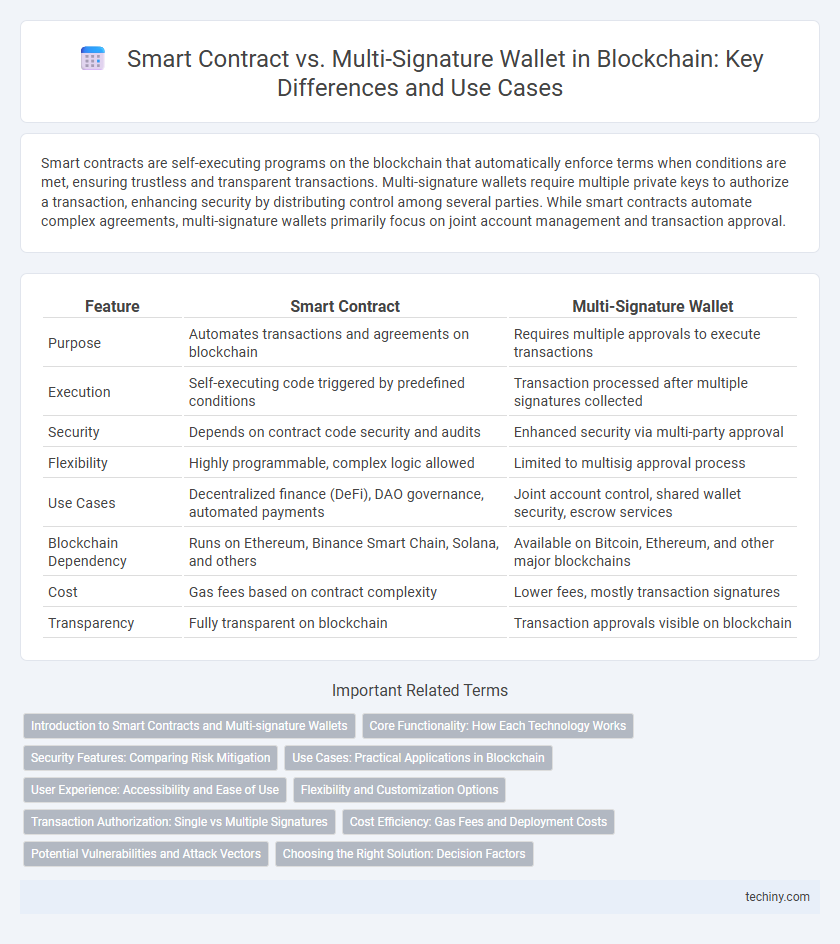Smart contracts are self-executing programs on the blockchain that automatically enforce terms when conditions are met, ensuring trustless and transparent transactions. Multi-signature wallets require multiple private keys to authorize a transaction, enhancing security by distributing control among several parties. While smart contracts automate complex agreements, multi-signature wallets primarily focus on joint account management and transaction approval.
Table of Comparison
| Feature | Smart Contract | Multi-Signature Wallet |
|---|---|---|
| Purpose | Automates transactions and agreements on blockchain | Requires multiple approvals to execute transactions |
| Execution | Self-executing code triggered by predefined conditions | Transaction processed after multiple signatures collected |
| Security | Depends on contract code security and audits | Enhanced security via multi-party approval |
| Flexibility | Highly programmable, complex logic allowed | Limited to multisig approval process |
| Use Cases | Decentralized finance (DeFi), DAO governance, automated payments | Joint account control, shared wallet security, escrow services |
| Blockchain Dependency | Runs on Ethereum, Binance Smart Chain, Solana, and others | Available on Bitcoin, Ethereum, and other major blockchains |
| Cost | Gas fees based on contract complexity | Lower fees, mostly transaction signatures |
| Transparency | Fully transparent on blockchain | Transaction approvals visible on blockchain |
Introduction to Smart Contracts and Multi-signature Wallets
Smart contracts are self-executing agreements coded on blockchain networks that automatically enforce terms without intermediaries. Multi-signature wallets enhance security by requiring multiple private keys to authorize cryptocurrency transactions, minimizing the risk of unauthorized access. Both technologies improve trust and automation in decentralized finance ecosystems by enabling conditional control and collaborative transaction validation.
Core Functionality: How Each Technology Works
Smart contracts execute automated, self-enforcing agreements coded on blockchain networks to facilitate, verify, or enforce contract terms without intermediaries. Multi-signature wallets require multiple private keys to authorize a single transaction, enhancing security by distributing control among several parties. While smart contracts enable complex logic and conditional operations, multi-signature wallets primarily focus on shared transaction approval and increased protection against unauthorized access.
Security Features: Comparing Risk Mitigation
Smart contracts automate agreements on the blockchain by executing predefined conditions without human intervention, reducing risks related to manual errors but remaining vulnerable to coding bugs and exploits. Multi-signature wallets enhance security by requiring multiple private keys to authorize a transaction, significantly mitigating risks of single-point failure or unauthorized access. Combining both technologies strengthens overall blockchain security by leveraging automated enforcement alongside collaborative authorization protocols.
Use Cases: Practical Applications in Blockchain
Smart contracts automate complex agreements by executing predefined conditions without intermediaries, ideal for decentralized finance (DeFi) protocols and supply chain management. Multi-signature wallets enhance security by requiring multiple approvals for transactions, making them suitable for managing shared assets in corporate governance or joint investment accounts. Both tools strengthen trust and transparency in blockchain ecosystems by enforcing rules and controls tailored to specific use cases.
User Experience: Accessibility and Ease of Use
Smart contracts automate transactions on blockchain, offering users seamless and hands-free execution of agreements without intermediaries. Multi-signature wallets require multiple approvals for transactions, enhancing security but potentially complicating accessibility with extra steps. User experience depends on the need for simplicity versus security, where smart contracts prioritize ease of use and multi-signature wallets emphasize controlled access.
Flexibility and Customization Options
Smart contracts offer extensive flexibility and customization, enabling developers to create complex, programmable agreements with tailored conditions and automated execution on the blockchain. Multi-signature wallets provide enhanced security by requiring multiple approvals for transactions but lack the nuanced, programmable logic that smart contracts support. While multi-signature wallets focus primarily on transaction authorization, smart contracts enable a broader range of decentralized applications with dynamic, customizable workflows.
Transaction Authorization: Single vs Multiple Signatures
Smart contracts automate transaction authorization through predefined rules executed on the blockchain, allowing single or multiple signatories depending on the contract design. Multi-signature wallets require multiple private keys to approve a transaction, enhancing security by ensuring consensus among authorized parties before execution. This fundamental difference impacts transaction control, with smart contracts enabling programmable validation and multi-signature wallets relying on explicit multiple-key authorization.
Cost Efficiency: Gas Fees and Deployment Costs
Smart contracts often incur higher gas fees and deployment costs due to their complex programmable logic, making them less cost-efficient for simple transactions. Multi-signature wallets, by contrast, optimize cost efficiency with lower gas consumption since they primarily focus on requiring multiple approvals without extensive code execution. Selecting between the two depends on balancing operational complexity against gas fee minimization in blockchain transactions.
Potential Vulnerabilities and Attack Vectors
Smart contracts can have coding vulnerabilities such as reentrancy attacks, integer overflows, and logic errors that expose funds to unauthorized access or manipulation. Multi-signature wallets rely on multiple private keys to authorize transactions, but risks include key compromise, social engineering, and coordination failures that may lead to unauthorized or blocked transactions. Both systems require rigorous security audits and robust key management to mitigate risks associated with blockchain asset control.
Choosing the Right Solution: Decision Factors
Choosing between a smart contract and a multi-signature wallet depends on factors such as complexity of transactions, security requirements, and flexibility. Smart contracts offer automated, programmable agreements ideal for complex decentralized applications, while multi-signature wallets provide enhanced security through multiple approvals for fund transfers. Assessing use case specifics, including transaction frequency and risk tolerance, is essential to determine the optimal blockchain solution.
Smart Contract vs Multi-signature Wallet Infographic

 techiny.com
techiny.com